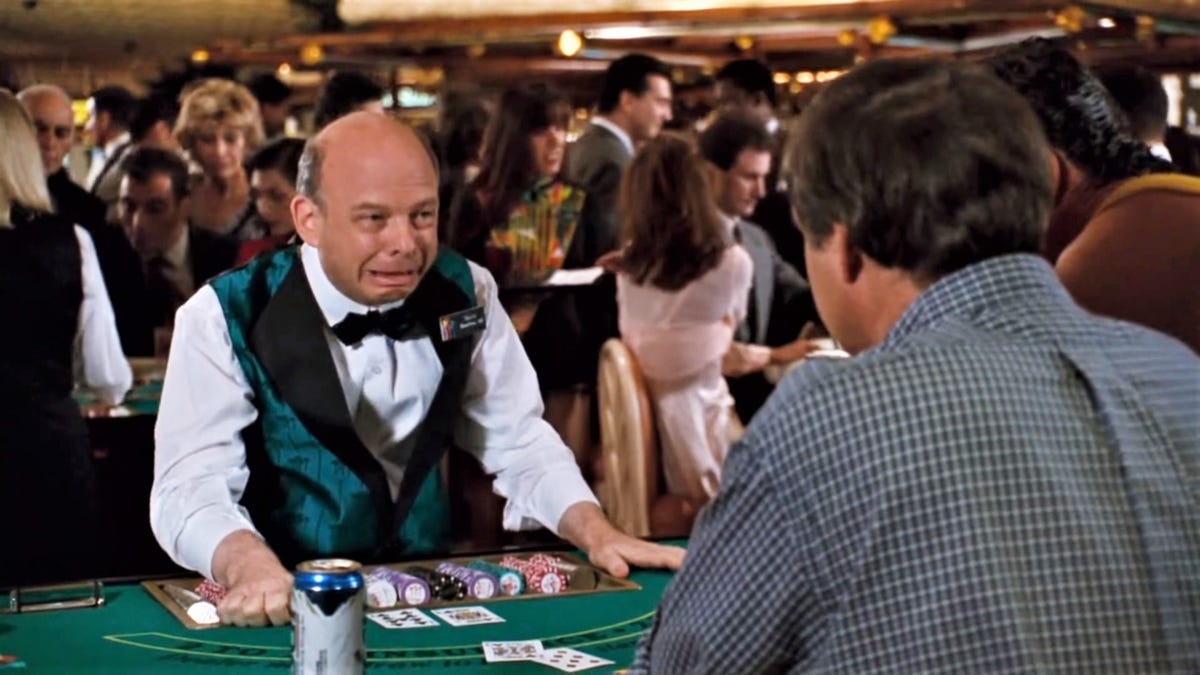Here are 10 things you should never do while sitting at a blackjack table: 10. Don’t hand your money to the dealer When you're first hitting the tables, you are going to need to exchange your money for a stack of chips. To do so, you must place the money down on the table in front of your seat. Do not hand your money directly to the dealer. Claim: The average person can make a living off of blackjack. Between December and April, a gambler named Don Johnson, playing single blackjack hands of up to $100,000, reportedly walked away from Atlantic City's tables with a cool $15 million. Being a professional blackjack player requires self-discipline and self-control. Some people have a hard time managing themselves effectively. You must learn how to do this if you want to make money at blackjack. Don’t drink alcohol while you play: There is a time and a place for everything. Drinking alcohol at the blackjack table is a bad idea.
- How Much Money Does A Blackjack Table Makes
- How Much Money Does A Blackjack Table Makeover
- How Much Money Does A Blackjack Table Make A Day
Contents
- Yearly salary of a professional blackjack player
What is the salary of a professional blackjack player? It’s a common question I hear, but what would seem like a simple enough question actually has a fairly complex answer. First of all, the term “blackjack player salary” isn’t quite appropriate. Professional blackjack players don’t make a set amount of money every month like a salaried employee does. Playing blackjack for a living is more like owning your own business or working for 100% commission. Therefore different professional players make different amounts of money based on many varying factors. Some of the more obvious factors being the stakes the played at, the amount of time spent playing and the skill level of the player. There are also many less obvious factors involved in determining how much money a professional player will make. I’m not going to cover all of them here, but just a few of these additional variables include the quality of the blackjack games played, the card counting system used and the size of the player’s betting spread.


The “Salary” (Income) of a Pro Blackjack Player
How Much Money Does A Blackjack Table Makes
Blackjack Player EarningsEvery blackjack player has a theoretical “expected value” of their play. When you bet $100 on a hand, you’re going to win or lose $100 (assuming you don’t push, double, split, surrender or get a blackjack). However, over time there’s an average value of that hand. In card counting, high positive counts create a positive expected value for a card counter and negative counts create a negative expected value. Knowing this, and knowing how to take advantage of this, is the foundation of how professional blackjack players are able to make money.
How Much Money Does A Blackjack Table Makeover
So exactly what is the total overall expected value for a professional blackjack player? Check out the examples below to get an idea. For simplicity I’m going to do some rounding off and I’ll assume only one hand is being played with all counts being played through (no backing out on negative counts).
# of decks: 2
Rules: S17, DA2, DAS, no RSA
Stakes: $100 units
Betting Spread: 1-5 ($100-$500)
Penetration: 68%
Counting System: Hi-Opt II with Full Indices
Hands/Hour: 180
Expected Value = $390 per hour


# of decks: 1
Rules: H17, DA2, no DAS, no RSA
Stakes: $50 units
Betting Spread: 1-4 ($50-$200)
Penetration: 7 Rounds (heads up)
Counting System: Wong Halves with Illustrious 18 Indices
Hands/Hour: 200
Expected Value = $285 per hour

# of decks: 6
Rules: S17, DA2, DAS, LS, no RSA
Stakes: $50 units
Betting Spread: 1-10 ($50-$500)
Penetration: 80%
Counting System: Hi-Lo with Sweet 16 & Fab 4 Indices
Hands/Hour: 220 (heads up)
Expected Value = $275 per hour
Needless to say, changing any of the variables listed would alter the expected value of an hour played. Now let’s assume for simplicity that a professional blackjack player played each of these scenarios for 5 hours per week. That’s a respectable 15-hour work week (nice, right?). Here’s what the 15 hours per week would yield in theoretical expected value…
(5 hours X $390) + (5 hours X $285) + (5 hours X $275) = $4,750 per week
$4,750 X 4 weeks = $19,000 per month
Yearly Theoretical Earnings from Playing Blackjack
Okay, so in this example you’re looking at $19,000 per month, which would then be $228,000 per year if you played for 12 months. These numbers are theoretical, meaning that your reality will not be exactly there. You might overshoot your theoretical (gotta love that) or you might fall short (not as fun). However, if you play enough hours it all pans out over time, or at least your results will be in the ball park of your theoretical earnings. Getting it all in cash is nice too.
How Much Money Does A Blackjack Table Make A Day
If you’re contemplating a career as a professional blackjack player, you have to understand your own personal circumstances. You might play more or less hours than this. You might play higher quality or lower quality games. You might not have a very high skill level or you might play at higher or lower stakes. You also need to know what kind of bankroll can handle these levels of action, but that’s not something I’m going to get into here. This is just a teaser to show you the potential of a skilled blackjack player rather than a guide on how to actually reach these numbers. If you want to know everything that goes into being highly successful, you’re going to need to do more than just read a few pages off a website. You might want to consider my next blackjack class. I apologize for the shameless plug, but whether you want to become a professional player or just make some extra cash on the weekends, my class is definitely a smart investment.